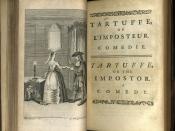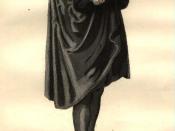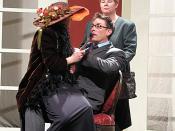The play 'Tartuffe', by Moliere, is a work that was created to show people a flaw in their human nature. There are two characters who portray the main flaw presented in the play. Both Madame Pernelle and Orgon are blinded to the farces of Tartuffe and must be coaxed into believing the truth. The fact that Orgon and Madame Pernelle are too weak to see the truth is the main driving force throughout the play.
The most obvious weakness shared between Orgon and Madame Pernelle is gullibility. The trait of gullibility can be seen as a family trait as suggested in an essay on 'Tartuffe' : 'His mother shares his capacity for self-delusion even after Tartuffe has been found out ('We cannot always judge by what we see')' (Weals). Orgon believes because Tartuffe claims to be a man of God he should put everything he has into Tartuffe's hands.
He proves how much he believes this after Damis tells him that Tartuffe was flirting with Elmire. From this accusation Orgon replies to Damis: 'I disinherit you; an empty purse / Is all you'll get from me - except my curse!' (III, vii , 68). Madame Pernelle shows the family trait that she shares with her son when she states: 'He's a fine man, and should be listened to.'(I, i ,44), while speaking of Tartuffe. Although they share this trait throughout the play, Orgon's eyes are finally opened at the end of the play while his mother is still held by the farce of Tartuffe.
Although Tartuffe is portrayed as the main character of the play, Orgon is the character who should really be paid attention to the most. As suggested in an essay on 'Tartuffe' audiences who concentrate on the character...


